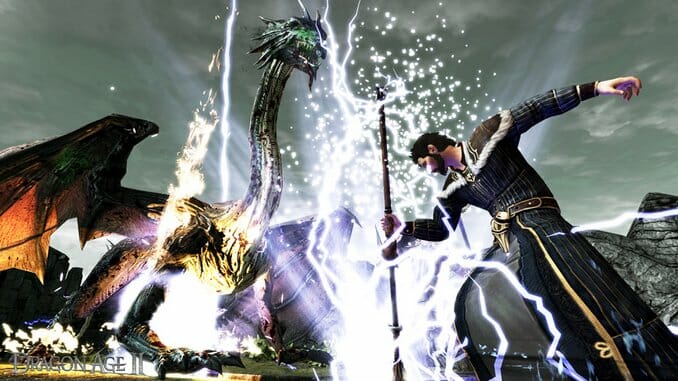Dragon Age 2 (Multi-Platform)

Dragon Age 2 is a stagnant, fragmented experience perhaps best described as the Two-Star Tapas Restaurant of Role Playing Games. My time with it felt akin to attending a dinner party and being fed unsatisfying side dish after unsatisfying side dish while awaiting a main course that never arrives. And then realizing that I have been handcuffed to my chair.
“Maybe I miss the journey,” I said to myself, trying to put my finger on why I was so thoroughly disenchanted with this game. Compared with its epic, far-ranging predecessor Dragon Age: Origins, Dragon Age 2 is a bit of a homebody—the narrative concerns itself entirely with the city of Kirkwall, and so players are rarely given the opportunity to leave the city’s cramped and dusty alleyways.
I have played games that relied on recycled locations before, but rarely has one felt as half-baked and haphazard as DA2. Over the course of the 35 hours it took me to complete the main campaign, I lost count of how many times I trundled through Hightown, Lowtown, Darktown, Daytown and In-Betweentown. (Only two of those are made up.) And as if the hunched, straightjacked feel of Kirkwall weren’t restrictive enough, any adventure outside its walls takes place upon either a single set of cliffside trails or within one of a couple of identical caves.
But although DA2’s claustrophobically unchanging backdrop is a mark against it, that alone didn’t seem entirely responsible for my distaste. And really, I’m not ready to say that I necessarily prefer the sweeping, Lord of the Rings-esque narrative of Origins. If David Simon’s HBO masterpiece The Wire taught us anything, it is that when told properly, the story of a single place can be as compelling, complex and satisfying as even the most globe-trotting of epics.
So clearly there must be other problems with this game. Okay then. To start with, navigation is a bungled mess. Kirkwall is a splintered, fragmented city, and each of its districts is separated from the others by a map and a loading screen. These maps are divided into three unchanging sections: City Day, City Night, and the aforementioned Trails Outside Of The City. Quest goals are so explicitly highlighted that they kill any desire players might have had to wander, not that the design of each area allows for much wandering anyway. By midway through the first act, I had accumulated so many sidequests (or in the game’s parlance, “quests”) that they had blurred together into a disorienting brown stew of vague objectives. Someone needs me to help a kidnapped mage… somewhere… and someone else needs help kidnapping a mage… somewhere else… and… something about a merchant…
I go to a cave or a warehouse not because I know where it is, but because it has a glowing arrow hanging over it on the map. I have a conversation, kill some dudes, and go back to where I started, only loosely aware of what it is that I just accomplished. My rewards feel hollow—item management has been scaled back so dramatically as to be borderline insulting, and the approval and disapproval of my compatriots feels transparent and inconsequential. Party members’ outfits cannot be altered, and hundreds of items are automatically marked as “loot” and unceremoniously sorted into a junkpile. In a weird sort of way it feels like I’m playing an up-res’d version of Dragon Age: Legends, the Facebook tie-in game for Dragon Age 2.
Surprisingly, the script is another area where Dragon Age 2 falters. Writing has often been one of BioWare’s greatest strengths, particularly the work of DA2’s head scribe David Gaider. But the overarching story here has some profound pacing problems; the first act is scattered and unpleasant, the second act feels like a third act, and the actual third act sits in a sort of limbo between being thematically interesting and structurally unnecessary.
While dialogue in Origins could become fairly ponderous, it at least had a welcomely dark sense of humor and frequently delved into topics of surprising philosophical depth. Comparatively, dialogue in DA2 is all flash and no substance; most of the jokes stem from self-aware mockery and pop culture references, and with a few notable exceptions, the main characters’ inner conflicts are pretty thin gruel. The script simply lacks the chewiness of Origins’ wandering digressions, and feels like a streamlined, tribute-band version of the original.
-

-

-

-

-

-

-

-

-

-

-

-

-

-

-

-

-

-

-

-

-

-

-

-

-

-

-

-

-

-

-

-

-

-

-

-

-

-

-

-








































